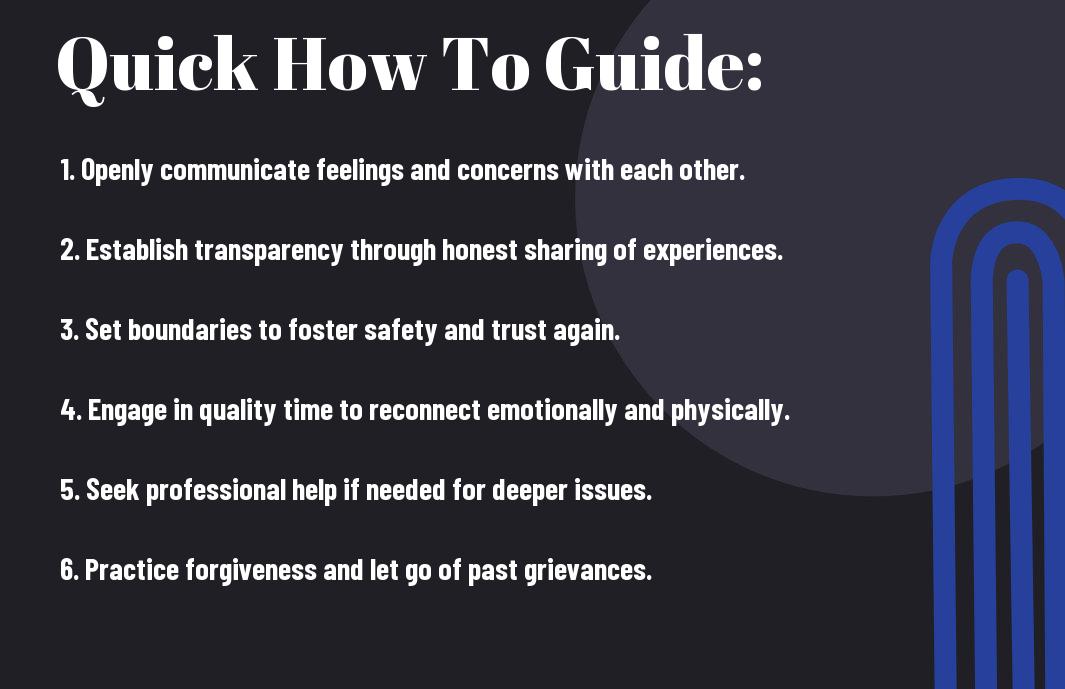There’s a path to healing and reconnection after the painful experience of infidelity. In this guide, you will discover effective strategies to help you restore trust and rebuild the emotional intimacy that once defined your relationship. By focusing on open communication, empathy, and patience, you can transform your bond into a stronger, more resilient connection. You deserve a joyful and loving relationship, and this journey towards renewed closeness starts now.
Key Takeaways:
- Open and honest communication is vital; create a safe space for both partners to express their feelings without judgment.
- Establish clear boundaries and expectations moving forward to rebuild trust and ensure both partners feel secure in the relationship.
- Engage in shared activities that promote bonding and emotional closeness, fostering a renewed sense of connection.
- Seek professional guidance or counseling to navigate complex emotions and facilitate healing through expert support.
- Practice patience and self-compassion, understanding that rebuilding intimacy is a gradual process that requires dedication and effort from both partners.

Understanding Infidelity
Your journey of healing begins with understanding the nature of infidelity. Infidelity can manifest in various forms, each impacting relationships in unique ways. It’s necessary to comprehend what led to this breach of trust so you can address it effectively.
Definition and Types of Infidelity
There’s a spectrum of what constitutes infidelity, which can complicate the healing process. Here’s a breakdown of its common types:
| Types | Description |
| Emotional | Deep connection with another person, often involving romantic feelings. |
| Physical | Engaging in sexual activity with someone outside the relationship. |
| Online | Involvement in romantic or sexual conversations through digital platforms. |
| Micro-cheating | Subtle behaviors that suggest disloyalty without crossing clear boundaries. |
| Increased Secrecy | Withholding information and creating emotional distance. |
Any understanding of these types can aid you in addressing specific issues that may arise in your relationship.
Emotional Impact on Relationships
With infidelity comes a profound emotional impact that can destabilize relationships. The trust once shared can be shattered, making it difficult for you and your partner to feel secure and connected.
Plus, the emotional fallout from infidelity can lead to feelings of betrayal, anger, and confusion for both partners. Trust needs to be rebuilt, which requires open communication and a commitment to understanding each other’s pain. The healing can lead to personal growth, strengthening the bond if navigated effectively. You may also find that mutual support and respect become necessary elements for both parties. Ultimately, addressing the emotional turmoil is key to moving towards a more fulfilling relationship.
How to Communicate Effectively
Even in the aftermath of infidelity, effective communication can become the bedrock for rebuilding intimacy. You must establish a safe space where both partners feel comfortable expressing their feelings and concerns. This requires a willingness to confront uncomfortable topics while nurturing an atmosphere of trust. As you engage in open dialogue, focus on fostering understanding, which is key to renewing your emotional connection.
Open and Honest Dialogue
The first step toward healing is engaging in open and honest dialogue. This means sharing your feelings, fears, and expectations without holding back. Speak from the heart and encourage your partner to do the same. This transparency is necessary for rebuilding trust and creating an environment where both partners can express themselves freely.
Active Listening Techniques
If you want to enhance communication, practicing active listening techniques is necessary. You need to focus fully on your partner without interrupting or planning your response while they speak. Show genuine interest by nodding or using verbal acknowledgments. Reflect back what your partner says to ensure you understand their perspective. This approach fosters a deeper emotional connection and demonstrates that you value their feelings.
Honest communication requires you to practice active listening, which can significantly improve your relationship dynamics. This means not only hearing your partner’s words but also validating their feelings. Use techniques such as paraphrasing what they say to ensure clarity and show that you’re engaged. Avoid distractions and dedicate time for meaningful conversations. Making this effort will help both of you feel heard and respected, paving the way for deeper intimacy as you heal together.

Rebuilding Trust
To effectively rebuild trust after infidelity, you must create an environment where honesty and transparency flourish. This involves open communication about feelings, acknowledging past mistakes, and consistently demonstrating commitment to the relationship. Both partners need to agree on the steps necessary to restore faith in each other, nurturing a safe space for healing and understanding. As you explore this journey together, make it a priority to be patient and compassionate towards each other to pave the way for renewal.
Acknowledging the Hurt
Some pain is unavoidable in the aftermath of infidelity. It’s important to recognize and validate the hurt feelings of both partners. Discussing how the betrayal impacted your emotional and physical connection can create a shared understanding. This acknowledgment paves the way for healing, allowing you to address your feelings without judgment. By giving voice to the pain, you create an opportunity for deeper intimacy and empathy moving forward.
Establishing New Boundaries
An important step in rebuilding intimacy is establishing new boundaries that promote trust and respect in your relationship. Clear guidelines help both partners feel secure and valued, enabling you to navigate potential triggers while fostering an emotionally safe environment. Discuss what you both need to feel comfortable, ensuring these boundaries are respected and revisited as necessary. Setting boundaries clarifies expectations and reinforces commitment to your renewed connection.
Plus, when you establish new boundaries, it’s important to openly communicate about what behaviors might have contributed to the breach of trust and how to avoid those in the future. For example, if late-night phone usage was a concern, agree on clear communication regarding phone access and transparency around incoming messages. These new agreements show your commitment to change and provide a sense of security in the relationship. By establishing and adhering to these parameters, you lay a strong foundation for rebuilding intimacy and fostering a healthier dynamic between you both.

Reconnecting Emotionally
Not addressing emotional wounds can hinder your journey to rebuild intimacy after infidelity. It’s necessary to create a safe space where both partners can express their feelings, fears, and aspirations. Engage in open communication and actively listen to one another—this is key to re-establishing trust and fostering a renewed emotional bond.
Shared Experiences and Time Together
One effective way to deepen your connection is by creating shared experiences that allow you to bond anew. Consider planning regular date nights, taking up a hobby together, or simply dedicating quiet time to engage in meaningful conversation. These moments can help you cultivate intimacy and strengthen your relationship as you rediscover each other.
Vulnerability and Transparency
For true intimacy to flourish, you must embrace vulnerability and transparency with your partner. Being open about your feelings, fears, and mistakes paves the way for a trusting relationship. This honesty fosters a deeper understanding of one another’s needs and emotions, which is necessary for healing post-infidelity.
Plus, engaging in vulnerability also means exposing your weaknesses and insecurities, which can be frightening but ultimately rewarding. By doing so, you invite your partner to share their own struggles, creating a space for mutual empathy and understanding. This shared experience not only helps you heal but also strengthens your bond, making it a foundational aspect of rebuilding intimacy. The more transparent you are, the more your partner will feel comfortable doing the same, leading to a profoundly connection and renewed trust.

Tips for Physical Intimacy
Once again, rebuilding physical intimacy after infidelity requires patience and understanding. Focus on rebuilding your emotional connection first, then gradually introduce physical affection. Here are some helpful tips:
- Communicate openly about your needs.
- Establish boundaries that feel safe for both partners.
- Take small steps towards physical affection.
- Prioritize time for quality moments together.
- Explore intimacy exercises that build trust.
Recognizing the importance of all these elements can aid in your healing journey. For more insights, check out Rekindling Desire After An Affair.
Gradual Re-establishment
There’s a need to approach physical intimacy with a gradual re-establishment. Start with simple acts like holding hands or hugging, which can help foster a sense of closeness. As trust rebuilds, you can slowly incorporate more intimate actions, ensuring that both partners feel comfortable and respected throughout the process.
Exploring New Ways to Connect
Clearly, expanding your emotional and physical connection after infidelity involves exploring new ways to connect. This might look like trying different types of date nights or even engaging in shared hobbies that promote teamwork and collaboration.
Another way to deepen your bond is by incorporating meaningful rituals into your routine—such as cooking together or enjoying a weekly movie night. Activities like these can promote positive interactions that help rebuild trust. Focus on being present and engaged during these moments, as they lay the foundation for stronger intimacy. However, be cautious of pushing boundaries too quickly—approaching the process with understanding will lead to more rewarding outcomes.
Factors Influencing Healing
Despite the challenges of healing after infidelity, several key factors can significantly influence your journey toward intimacy restoration. These include:
- Time to process emotions
- Patience with yourself and your partner
- Communication to foster understanding
- Commitment to the healing process
(li>Professional support for expert guidance
Recognizing these elements can help you navigate the complex emotions involved in rebuilding your relationship.
Time and Patience
Patience is vital in the healing process, as rebuilding intimacy takes time. You may feel a variety of emotions, including anger and sadness, which need to be processed adequately. Allow yourself and your partner to grieve the loss of trust and to gradually work through these emotions. It is important to acknowledge that healing does not happen overnight; it requires a steady commitment to growth and understanding.
Professional Support and Counseling
Any couple facing the aftermath of infidelity can benefit from professional support, which offers a safe space for open dialogue. Engaging with a counselor or therapist provides you with the tools to navigate the complex emotions and conflicts that arise.
Understanding the role of professional support in your healing journey is vital. Therapists can help unveil underlying issues that may have contributed to the infidelity, allowing you to address them constructively. Couples counseling promotes open communication, fostering a deeper emotional connection. With guidance from a trained professional, you can rebuild trust more effectively and avoid potential pitfalls that could lead to further emotional turmoil. Remember that seeking help is a step toward a healthier, more satisfying relationship.
Conclusion
So, as you navigate the challenging journey of rebuilding intimacy after infidelity, focus on open communication and vulnerability with your partner. By establishing trust and understanding, you can create a stronger emotional connection. Embrace the process, be patient with yourself and each other, and practice the strategies outlined in this guide to foster healing and renewal in your relationship. Your commitment to growth and intimacy will pave the way for a more loving and fulfilling partnership.
FAQ
Q: What are the first steps to take after discovering infidelity?
A: The initial steps involve open communication. It’s important for both partners to express their feelings honestly and listen to each other without interruptions. Set aside time for these conversations, ensuring a safe environment where emotions can be shared without judgment. Additionally, consider seeking professional help to guide these discussions and provide support during this painful time.
Q: How can we begin rebuilding trust after a betrayal?
A: Rebuilding trust requires consistent and transparent actions over time. The partner who was unfaithful should openly discuss the reasons behind their actions while demonstrating accountability and reliability. This includes being open about their whereabouts and encouraging questions from the betrayed partner. Trust is rebuilt gradually, so it’s important to be patient and committed to this process.
Q: What role does forgiveness play in healing from infidelity?
A: Forgiveness is a personal journey that differs for everyone. It does not mean excusing the infidelity but rather releasing the hold that anger and resentment have on your life. For the betrayed partner, this may involve processing their feelings, understanding the situation fully, and ultimately deciding to let go of the hurt. Seeking individual therapy can be beneficial in navigating this complex emotion.
Q: How can we re-establish intimacy after the emotional fallout of infidelity?
A: Re-establishing intimacy starts with reconnecting on an emotional level. Engage in activities that promote bonding, such as date nights, shared hobbies, or simple conversations about each other’s lives. Physical intimacy can be gradually restored by taking small steps, beginning with non-sexual touch, and ensuring both partners feel comfortable and safe. Progress should be made at a pace that feels right for both individuals.
Q: What if one partner is still struggling with feelings of hurt and betrayal?
A: It’s normal for feelings of hurt to resurface even after taking steps toward healing. Both partners should be willing to acknowledge these feelings and maintain open lines of communication. It may be helpful to have regular check-ins to discuss emotions and progress. If these lingering feelings are affecting the relationship significantly, exploring couples therapy can provide additional support in processing these emotions together.
